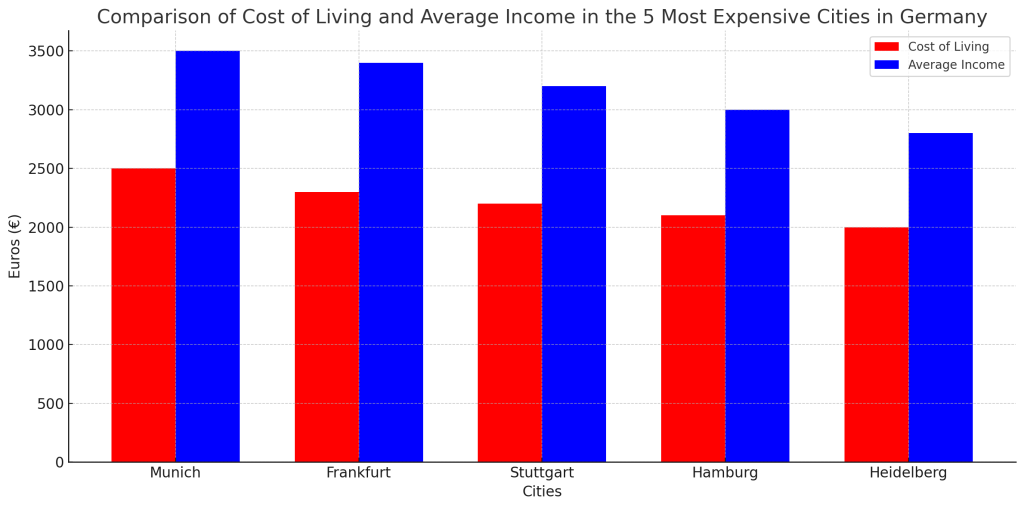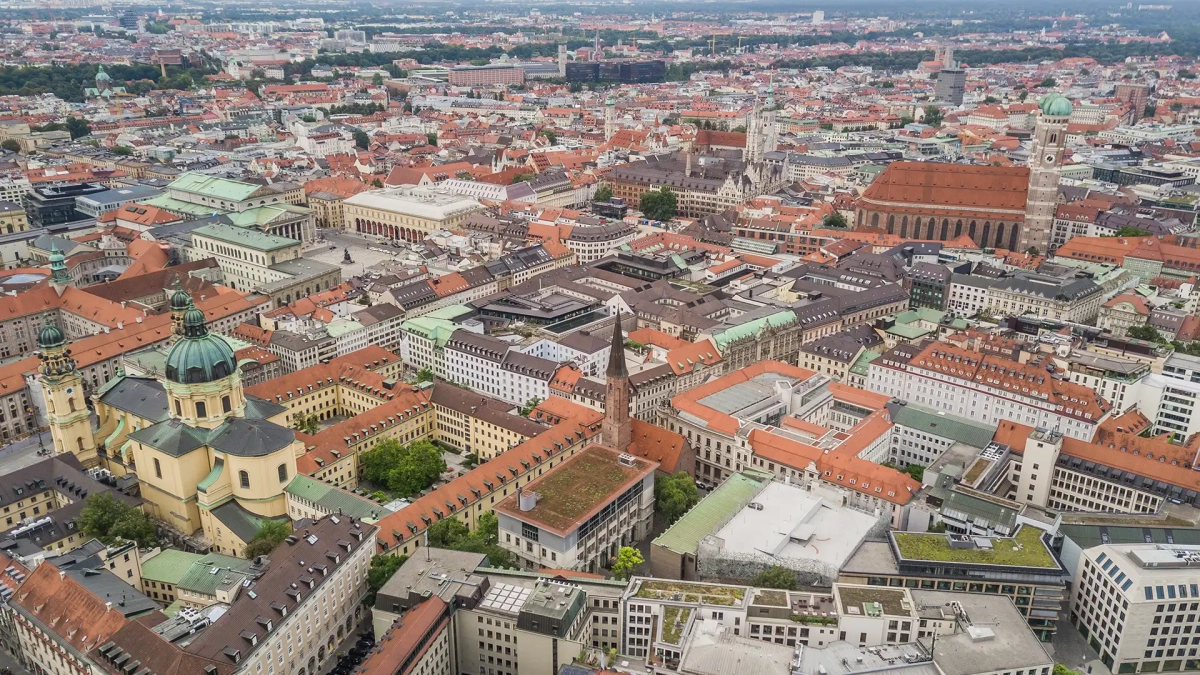The Most Expensive Cities in Germany: A Comprehensive Guide
Germany is known for its rich history, robust economy, and high quality of life. However, living in some German cities comes with a hefty price tag. This comprehensive guide ranks the most expensive cities in Germany from the most to the least expensive, providing detailed insights into the cost of living, average income, rental prices, and other essential factors that influence everyday life.

1. Munich, The Most Expensive German City
Munich, the capital of Bavaria, consistently tops the list as the most expensive city in Germany. Renowned for its cultural heritage, Oktoberfest, and strong economy, Munich attracts both tourists and professionals from around the world.
Cost of Living in Munich
- Average Monthly Expenses (Single Person): Approximately €2,500
- Groceries: Prices are about 10% higher than the national average.
- Transportation: A monthly public transport ticket costs around €60.
Average Income in Munich
- Average Monthly Net Salary: Approximately €3,500
- Major Industries: Automotive, technology, finance, and media.
Rental Prices in Munich
- One-Bedroom Apartment (City Center): €1,500 – €2,000 per month
- One-Bedroom Apartment (Outside City Center): €1,000 – €1,500 per month
- Three-Bedroom Apartment (City Center): €2,500 – €3,500 per month
Lifestyle and Attractions
- Quality of Life: High
- Attractions: Marienplatz, English Garden, Nymphenburg Palace
- Education: Home to prestigious institutions like Ludwig Maximilian University.
2. Frankfurt am Main
Frankfurt is Germany’s financial hub, hosting the European Central Bank and numerous multinational companies. Its skyline is dotted with skyscrapers, giving it a modern cosmopolitan vibe.
Cost of Living in Frankfurt
- Average Monthly Expenses (Single Person): Approximately €2,300
- Groceries: Slightly above the national average.
- Transportation: Monthly pass costs around €90.
Average Income in Frankfurt
- Average Monthly Net Salary: Approximately €3,400
- Major Industries: Finance, banking, and aviation.
Rental Prices in Frankfurt
- One-Bedroom Apartment (City Center): €1,200 – €1,800 per month
- One-Bedroom Apartment (Outside City Center): €900 – €1,300 per month
- Three-Bedroom Apartment (City Center): €2,200 – €3,000 per month
Lifestyle and Attractions
- Quality of Life: High
- Attractions: Römerberg, Goethe House, Main Tower
- International Community: Diverse, with a significant expat population.
3. Stuttgart
Stuttgart is the capital of Baden-Württemberg and a major industrial city, especially known for automotive giants like Porsche and Mercedes-Benz.
Cost of Living in Stuttgart
- Average Monthly Expenses (Single Person): Approximately €2,200
- Groceries: Around 5% higher than the national average.
- Transportation: Monthly ticket costs about €80.
Average Income in Stuttgart
- Average Monthly Net Salary: Approximately €3,200
- Major Industries: Automotive, engineering, and technology.
Rental Prices in Stuttgart
- One-Bedroom Apartment (City Center): €1,000 – €1,500 per month
- One-Bedroom Apartment (Outside City Center): €800 – €1,200 per month
- Three-Bedroom Apartment (City Center): €2,000 – €2,800 per month
Lifestyle and Attractions
- Quality of Life: High
- Attractions: Stuttgart TV Tower, Wilhelma Zoo, Porsche Museum
- Education: Several universities and research institutions.
4. Hamburg
Hamburg is Germany’s second-largest city and its primary port, playing a crucial role in international trade. The city is known for its maritime charm and vibrant cultural scene.
Cost of Living in Hamburg
- Average Monthly Expenses (Single Person): Approximately €2,100
- Groceries: Comparable to the national average.
- Transportation: Monthly pass is around €80.
Average Income in Hamburg
- Average Monthly Net Salary: Approximately €3,000
- Major Industries: Shipping, media, and aerospace.
Rental Prices in Hamburg
- One-Bedroom Apartment (City Center): €1,000 – €1,600 per month
- One-Bedroom Apartment (Outside City Center): €800 – €1,200 per month
- Three-Bedroom Apartment (City Center): €2,000 – €2,800 per month
Lifestyle and Attractions
- Quality of Life: High
- Attractions: Port of Hamburg, Miniatur Wunderland, Elbphilharmonie
- Nightlife: Famous for the Reeperbahn district.
5. Heidelberg
Heidelberg is a picturesque city known for its romantic old town and historic university, one of the oldest in Europe.
Cost of Living in Heidelberg
- Average Monthly Expenses (Single Person): Approximately €2,000
- Groceries: Slightly above average due to tourism.
- Transportation: Monthly ticket costs about €70.
Average Income in Heidelberg
- Average Monthly Net Salary: Approximately €2,800
- Major Industries: Education, research, and tourism.
Rental Prices in Heidelberg
- One-Bedroom Apartment (City Center): €900 – €1,400 per month
- One-Bedroom Apartment (Outside City Center): €700 – €1,000 per month
- Three-Bedroom Apartment (City Center): €1,800 – €2,500 per month
Lifestyle and Attractions
- Quality of Life: High
- Attractions: Heidelberg Castle, Old Bridge, Philosopher’s Walk
- Student Life: Vibrant, due to the large student population.
6. Düsseldorf
Düsseldorf is famous for its fashion industry and art scene. The city hosts numerous trade fairs and is a hub for advertising and telecommunications.
Cost of Living in Düsseldorf
- Average Monthly Expenses (Single Person): Approximately €2,000
- Groceries: On par with the national average.
- Transportation: Monthly pass costs around €80.
Average Income in Düsseldorf
- Average Monthly Net Salary: Approximately €3,000
- Major Industries: Fashion, telecommunications, and advertising.
Rental Prices in Düsseldorf
- One-Bedroom Apartment (City Center): €900 – €1,400 per month
- One-Bedroom Apartment (Outside City Center): €700 – €1,000 per month
- Three-Bedroom Apartment (City Center): €1,800 – €2,600 per month
Lifestyle and Attractions
- Quality of Life: High
- Attractions: Königsallee, Rhine Tower, Old Town (Altstadt)
- Cultural Scene: Rich, with numerous galleries and theaters.
7. Cologne (Köln)
Cologne is one of Germany’s oldest cities, famous for its impressive cathedral and vibrant cultural life.
Cost of Living in Cologne
- Average Monthly Expenses (Single Person): Approximately €1,900
- Groceries: Slightly below the national average.
- Transportation: Monthly ticket costs about €90.
Average Income in Cologne
- Average Monthly Net Salary: Approximately €2,800
- Major Industries: Media, tourism, and automotive.
Rental Prices in Cologne
- One-Bedroom Apartment (City Center): €900 – €1,300 per month
- One-Bedroom Apartment (Outside City Center): €700 – €1,000 per month
- Three-Bedroom Apartment (City Center): €1,700 – €2,500 per month
Lifestyle and Attractions
- Quality of Life: High
- Attractions: Cologne Cathedral, Museum Ludwig, Rhine River cruises
- Festivals: Famous for its annual Carnival.
8. Berlin
As the capital city, Berlin is a melting pot of cultures, history, and innovation. It offers a unique blend of historical landmarks and a cutting-edge arts scene.
Cost of Living in Berlin
- Average Monthly Expenses (Single Person): Approximately €1,800
- Groceries: Generally lower than the national average.
- Transportation: Monthly pass costs around €80.
Average Income in Berlin
- Average Monthly Net Salary: Approximately €2,700
- Major Industries: Technology, creative industries, and government services.
Rental Prices in Berlin
- One-Bedroom Apartment (City Center): €1200 – €1,500 per month
- One-Bedroom Apartment (Outside City Center): €800 – €1,200 per month
- Three-Bedroom Apartment (City Center): €2,500 – €3,000 per month
Lifestyle and Attractions
- Quality of Life: High
- Attractions: Brandenburg Gate, Berlin Wall, Museum Island
- Nightlife: Diverse and vibrant, with options for all tastes.
9. Freiburg im Breisgau
Located near the Black Forest, Freiburg is known for its medieval architecture and eco-friendly initiatives.
Cost of Living in Freiburg im Breisgau
- Average Monthly Expenses (Single Person): Approximately €1,800
- Groceries: Slightly higher due to its location.
- Transportation: Monthly ticket costs about €60.
Average Income in Freiburg im Breisgau
- Average Monthly Net Salary: Approximately €2,600
- Major Industries: Renewable energy, education, and tourism.
Rental Prices in Freiburg im Breisgau
- One-Bedroom Apartment (City Center): €900 – €1,200 per month
- One-Bedroom Apartment (Outside City Center): €800 – €900 per month
- Three-Bedroom Apartment (City Center): €1,600 – €2,200 per month
Lifestyle and Attractions
- Quality of Life: High
- Attractions: Freiburg Minster, Schlossberg, Black Forest trails
- Sustainability: Known for its green initiatives and solar energy projects.
10. Bonn
Formerly the capital of West Germany, Bonn is a city rich in history and culture, located along the Rhine River.
Cost of Living in Bonn
- Average Monthly Expenses (Single Person): Approximately €1,700
- Groceries: Comparable to the national average.
- Transportation: Monthly pass costs around €80.
Average Income in Bonn
- Average Monthly Net Salary: Approximately €2,800
- Major Industries: Telecommunications, logistics, and international organizations.
Rental Prices in Bonn
- One-Bedroom Apartment (City Center): €900 – €1,200 per month
- One-Bedroom Apartment (Outside City Center): €700 – €900 per month
- Three-Bedroom Apartment (City Center): €1,600 – €2,200 per month
Lifestyle and Attractions
- Quality of Life: High
- Attractions: Beethoven House, Bonn Minster, Museum Mile
- Education: Home to the University of Bonn.
Germany offers a high standard of living across all its cities, but the cost can vary significantly. Munich tops the list as the most expensive city, followed by Frankfurt and Stuttgart. Factors such as average income, rental prices, and general expenses like groceries and transportation play a crucial role in determining the cost of living.
When considering a move to Germany, it’s essential to weigh these factors against personal preferences such as lifestyle, career opportunities, and cultural attractions. Whether you’re drawn to the bustling streets of Berlin or the scenic beauty of Freiburg, Germany has a city that fits your needs.
Affordable German Cities: Germany’s Moderate-Cost Living Destinations
Germany offers a variety of cities with a balanced cost of living, perfect for those seeking a comfortable lifestyle without the high expenses of major metropolitan areas. These cities provide a great quality of life, combining cultural richness, job opportunities, and affordable amenities. From historic cities like Augsburg and Mainz to vibrant hubs like Leipzig, here’s a guide to Germany’s moderately priced cities, ideal for students, professionals, and families alike. Explore these locations for an enjoyable life in Germany at a budget-friendly pace.
These cities provide a good quality of life at a balanced price point, appealing to both residents and newcomers:
- Augsburg – Known for its historical charm and affordability compared to nearby Munich, with moderate costs in dining and housing.
- Leipzig – Often dubbed “Hypezig” due to its growing appeal, Leipzig offers affordable rent, a lively cultural scene, and a balanced cost of living.
- Dresden – A picturesque city with stunning architecture, Dresden offers budget-friendly living, moderate rent, and low grocery costs.
- Mainz – Located on the Rhine, Mainz has a balanced cost structure, especially appealing for families and students with moderate rental prices.
- Hannover – This commercial center offers affordable housing and transport, making it ideal for a comfortable lifestyle without high expenses.
- Kiel – A coastal city with moderate rent and living costs, perfect for those who enjoy a relaxed atmosphere near the sea.
- Mannheim – Known for its accessible location, Mannheim has moderate costs in housing and dining, popular among students and professionals.
- Essen – Located in the Ruhr area, Essen is affordable with reasonable rents and a comfortable lifestyle, close to cultural and industrial hubs.
- Karlsruhe – This city offers a balanced cost of living with moderate rental prices, popular for its pleasant weather and educational institutions.
- Wiesbaden – Known for its spa culture and picturesque surroundings, Wiesbaden has a balanced cost structure, particularly in housing and dining.
These cities strike a balance between affordability and quality, making them ideal for those looking for a comfortable lifestyle in Germany without the high costs of the most expensive cities.
How informative was this article?
Click on a star to rate it!
We are sorry that this post was not useful for you!
Let us improve this post!
What is missing in the article?















